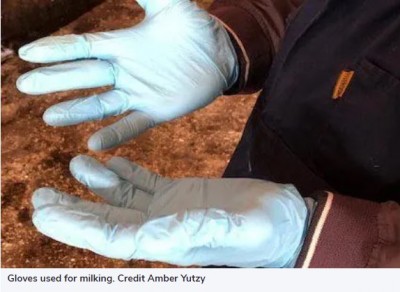Gloves: Are You Protecting Your Herd? - PSU Extension

by Amber Yutzy (Assistant Director, Animal Systems Programs - PSU). To access original article, click here
Weekly we receive calls from producers experiencing milk quality issues on their farms. Often, we find common denominators on each farm that is the source of the high somatic cell count (SCC). Wearing gloves is a simple management practice that could help reduce contagious and environmental bacteria spread between quarters and cows.
Do you wear gloves while milking cows? You should! Gloves are a very inexpensive prevention tool for a large cost problem. This preventative tool can help to prevent bacteria and dirt from staying in the cracks, crevices, and fingernail beds on your hands. Gloves can easily be disinfected between cows because of their smooth surface. Studies have shown that there are 75% fewer bacteria on used gloves than on bare hands. Wearing gloves also reduces the spread of contagious and environmental bacteria by 50%.
Bacteria causing contagious mastitis on a farm is hard to cure, causing farms loss of milk production and money. Cows infected with contagious mastitis often cause a high bulk tank Somatic Cell Count (SCC). Due to this, producers should take every step necessary to prevent the spread of bacteria to other herd mates or within the udder. This bacteria travels from quarter to quarter via milk on your hands or within the milking unit. To limit the spread of contagious mastitis, milking practices such as milking infected animals last, post-milking teat disinfectant, universal dry cow treatment, and wearing gloves should be implemented on your farm.
In today's milk market, gloves are necessary to reach the highest premium available to your farm. It should be written into your standard operating procedures and required that all employees wear them. When choosing a glove, be sure that it smoothly fits the employee's hands like skin. Gloves come in many sizes and colors. It may be necessary to buy a variety to find what works on your farm. Gloves that are too large often tear easily and get stuck in the inflations due to vacuum. Gloves should be disinfected regularly during milking with teat dip or disinfecting solution. Used gloves should be disposed of; reusing gloves makes them brittle, causing frequent tears and increased risk of udder contamination.
Wearing gloves is an inexpensive tool to help reduce overall herd SCC without a significant investment. Will it take a while for you and your employees to get acclimated to how they feel? Yes, but it is worth the time and effort in the long run. Who knew something as easy as putting on a pair of milking gloves could help you reduce your overall herd SCC and increase profits on your farm?
If your farm is experiencing milk quality problems and wants to learn more, please contact Camila Lage at 607-422-6788
Upcoming Events
Crops, Cows & Critters - Southwest New York Dairy, Livestock & Field Crops Newsletter Sponsorship
December 19, 2025
Our two forms of publications feature research-based and timely information from our four specialists, listed to the right, along with local event notifications and Cornell University outreach. This information is provided to participants who range from dairy, livestock, and field crops producers to agricultural suppliers and consultants.
Weekly Email Update: Shared with 625+ households who have signed up with our program.
Monthly Paper Mailer: To reach our stakeholders and farmers who lack internet access, we send out a monthly mailer where your company's logo and contact information would be featured with a mailing list of 330+ households.
If you sponsor our weekly and monthly publications you reach approximately 955 households.
Visit our website to view our newsletters!
2025 Cornell Food Beverage & Animal Feed Manufacturer Survey
December 19, 2025
Industry and Educational Advocates for New York State's Food, Beverage, and Animal Feed Manufacturing industries:
As you know, NYS has a diverse food and beverage manufacturing industry, in both the types of industries that exist and the wide distribution of firms by scale. Many manufacturing firms have strong backward linkages to agricultural production sectors in the state that support both farm-level and downstream food industry firms and consumers. In collaboration with the New York State Department of Agriculture and Markets, a team from Cornell University's Charles H. Dyson School of Applied Economics and Management has recently rolled out the 2025 New York State Food, Beverage, and Animal Feed Manufacturer Survey. The industry will benefit from an updated assessment of the industry that informs private and public investments and opportunities to support firm growth and improved profitability.
Cornell Organic Field Crops & Dairy Conference
March 6, 2026
Waterloo, NY
Farmers, researchers, educators, and agricultural service providers from across the Northeast are invited to the 2026 Cornell Organic Field Crops & Dairy Conference, held Friday, March 6, 2026, from 8:00 a.m. to 4:30 p.m. at the Lux Hotel & Conference Center in Waterloo, N.Y.
Co-hosted by New York Soil Health and Cornell CALS, the annual conference brings together leaders in organic grain, dairy, and livestock systems to share practical tools, new research, and farmer-tested strategies to support resilient and profitable organic production.
Announcements
No announcements at this time.





